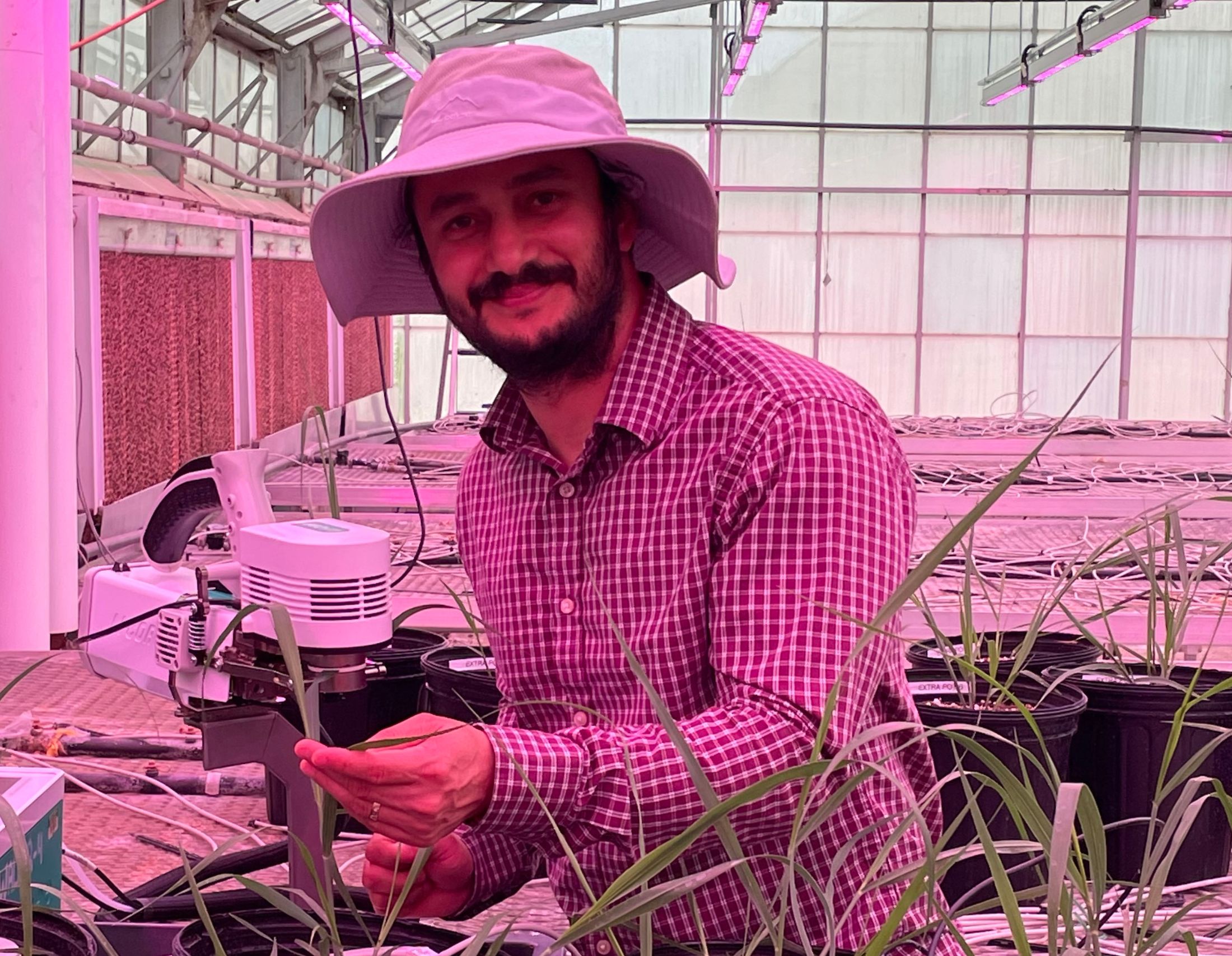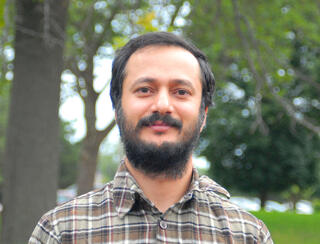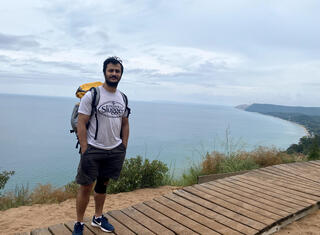
In this series, we learn more about what inspired our talented graduate students and postdoctoral researchers, what brought them to their field of study, and the questions that drive their work at the Great Lakes Bioenergy Research Center (GLBRC).
Binod Basyal is a post-doctoral Research Associate at the Department of Energy Plant Research Lab within the Great Lakes Bioenergy Research Center at Michigan State University. He tells us about his research, his background and the importance of optimism in solving complex problems.
Can you tell us about your background and how you arrived in the field of plant science?
I’ve always been very passionate about plants. I was born and brought up in Nepal, a southeast Asian country that is full of forested mountains. Plants have always fascinated me. They have old, ancient origins and they form the basis for almost all of life because they harvest the energy from the sun and we use that harvested energy. All life forms use that harvested energy. I always wanted to study plants.
Can you explain what you do in your research?
I’m a postdoctoral research associate here at MSU working on a GLBRC project. I study the interaction of a plant with its physical environments as well as its biological environments and, to be more precise, how a plant interacts with drought. And to be even more precise, the extreme nature of drought—intense drought— how the plant’s biochemistry and physiology responds to that kind of extreme environment.
I've always been very passionate about plants. I was born and brought up in Nepal, a southeast Asian country that is full of forested mountains. Plants have always fascinated me.
Another equally important side of my research is that I study how plants make associations with below-ground organisms like soil micro-organisms. I study how that association is beneficial to plants in terms of plants' ability to cope with environmental stressors.
Last year, I developed a sensor-based automated irrigation system using cheap microcomputers (raspberry pi). Currently, I am conducting an experiment where I'm using that system to impose drought in switchgrass at different growth stages to see how that affects gene expression and metabolism among other things.
I study plants’ association with soil fungi, particularly arbuscular mycorrhizal fungi, which are beneficial. There are different kinds of fungi, right? A lot cause disease to the plant or are parasitic or pathogenic. But the type of fungi that I study is actually helpful to the plant, forms association with the roots of the plant, and acts as an extension to the roots of the plant, and helps plants search for water and nutrients in poor soil conditions.

Is there something that you’ve discovered that caused you to believe this research would be particularly useful for bioenergy?
Yes! In nature, life involves association with other organisms- in biology this is called symbiosis. The associations operate in a continuum of benefits and harms. It’s not that a plant always benefits from these fungi, or even with pollinators, or any other kind of mutually beneficial association. Some studies in the past have shown this kind of fungi can sometimes be parasitic if the plant is under too much light or soil nutrient distress. If you provide shade to the plant so it doesn’t receive enough sunlight to do photosynthesis, the plant is not forming enough sugar because it requires sunlight to perform photosynthesis and form sugar. In ideal conditions, sugar goes to the fungi and in return the fungi provide soil nutrients and water to the plant: this is the trade between these two organisms. But in environmental extremes, like very low light conditions, the plant doesn’t form much sugar but still has to provide some to the fungi. The cost to benefit ratio becomes high.
I wanted to look at this with a more relevant and practical environmental situation: drought. Because the future climate scenarios are going to be very intense drought, a high propensity for drought, I wanted to know whether these fungi are actually beneficial under such circumstances or if they become parasitic. About 80% of all terrestrial plants develop an association with this kind of fungi so it’s very important to understand how this association works under this high drought condition.
And what I found was: I placed plants in really stressed soil moisture conditions– really dry soil— and the fungi were still beneficial to the plants. They were not becoming parasitic. They were still providing all the benefits to the plants. The plants showed improved photosynthesis and were putting on more mass when they were associated with the fungi. So, that tells me that this kind of microbial association can be really important in the future climate change scenario where drought is going to be really severe. It opens up avenues to genetically engineered plants and fungi to harness the potential of this association to the fullest, while anticipating the worst in terms of climate change.
What did your education and career path look like?
I was looking for a PhD opportunity where I could study plant ecology and I got a position at the University of Louisville in Kentucky where I studied the ecology of plants. I studied the interaction of plants with arbuscular mycorrhiza fungi, under some level of drought, the interaction with plant parasitic pathogens, nematodes and stuff like that. But since I studied switchgrass in my doctorate, I got more interested in the cell wall chemistry of the plant and the potential of the plant to be used as ultimately a biofuel crop in the future.
What do you think your next steps are for where you want to take your research?
I’m looking more at the genetic level of the response for the plant to the drought, like looking at what kinds of genes are expressed. For example, I’m droughting plants at certain stages— early drought, mid-life cycle drought, late-stage drought to see what kind of genes regulate the response of the plant. In terms of long-term steps, I’m working on building collaborations and further along may look for challenges or opportunities outside of academia.

Do you have any advice for future graduate students or undergraduates considering bioenergy research?
Research in bioenergy is really important because you’re tackling one of the greatest challenges that humanity is facing: climate change. Working on even a small part of that can contribute to increasing sustainability of energy. That can be a driving force to do research. For undergrads, I would advise that if you want to get into this field to try and get hands-on experience in biological research. Do some field work or surveying and stay updated on current research with what’s going on in the field of energy, bioenergy fuel crops, etc.
One of the most important things is finding a good mentor, especially for students pursuing a PhD degree. Take time, look at the lab, look at the PI (principal investigator), contact the lab members and find a good PI or a mentor who supports you in your research. There are going to be some challenges but none of them are unsolvable.
What recommendations do you have for how people can approach staying informed and focused on solutions?
Media can sometimes focus on the negative aspects that humanity will go extinct. We have seen a massive collapse of biodiversity and it might happen if we aren’t careful. But if we become careful, we can definitely tackle this. Instead of relying on mass media, rely on science news outlets or scientific journals that know what is actually happening. Once you know what is happening, you can support policies and people like senators or representatives who are trying to bring policies forward in enhancing renewable energies. Or if you have the money, invest in businesses that promote renewable resources. You can have very constructive discussions in your community. Ask: “Hey- what’s going on, how is this affecting our community, how can we work with scientists to tackle this problem rather than living in fear?”
What do you like to do outside of work?
I like hiking. Just this last weekend I went to northern Michigan to one of the islands off of Sleeping Bear Dunes, called South Manitou. It’s really beautiful. If I’m not hiking, I like to watch movies with my wife. My wife and I also play musical instruments. I play guitar and my wife plays keyboard. We play all kinds of songs. Lately we’ve been doing a lot of Beatles. Mostly we do slow rock ballads. Food is also very important- I like to experiment with food from all over the world.
What’s your favorites Beatles song?
Right now? Long and Winding Road. I love the Beatles- they're my favorite band.